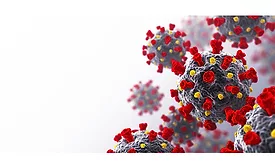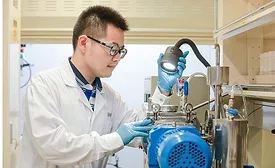Home » Keywords: » antimicrobial coatings
Items Tagged with 'antimicrobial coatings'
ARTICLES
Top 5 News that Sticks
Last week, readers were most interested in Sika’s announcement regarding its planned acquisition of Hamatite.
Read More
Top 5 News that Sticks
New DuPont Facility Garners Most Reader Interest
DuPont’s announcement regarding a new adhesives facility in China drew the most reader interest last week.
May 10, 2021
Kraton Block Copolymer Granted Section 18 Emergency Exemption by EPA
The EPA exemption will allow Delta Air Lines to use the block copolymer in specific applications in Georgia, Utah, and Minnesota to protect against the SARS-CoV-2 virus.
April 27, 2021
Are Antimicrobial Coatings Effective in the Fight Against COVID-19?
Major growth of antimicrobial coatings is projected within the transportation and medical industries, as well as deployment in public spaces.
January 4, 2021
3M and Safran Announce Partnership to Design Cleaner Aircraft Interiors
As part of the new collaboration, 3M will provide technologies to help design cleaner aircraft cabin interiors.
November 30, 2020
Top 5 News that Sticks
Readers Most Interested in New WACKER Facility
WACKER’s announcement regarding a new facility for thermal interface materials garnered the most reader interest last week.
September 28, 2020
Top 5 News that Sticks
Kraton Regulatory Push Is Top News
Last week, an announcement from Kraton regarding efforts to gain regulatory approvals drew the most reader interest.
September 21, 2020
Kraton Seeking Regulatory Approvals for Block Copolymer Use as Disinfectant
Depending on the regulatory approval process or certification requirements by country, Kraton believes that BIAXAM could be used as a coating on personal protective equipment (PPE) and as a replaceable peel-and-stick film for a broad range of applications.
September 10, 2020
Revenues from Smart Coatings and Surfaces for Combatting Bacteria and Viruses Projected to Top $1 Billion by 2025
The severity of COVID-19 means that both consumer and industrial markets are now intensely interested in providing antimicrobial protection to employees and loved ones.
September 8, 2020
AKZONOBEL: Enhanced Powder Coating
According to AkzoNobel, the extra functionality offered by the inclusion of antimicrobial technology means that building interiors can now be given increased protection against microbes such as bacteria and mold.
August 4, 2020
Keep the info flowing with our newsletters!
Get the latest industry updates tailored your way.
JOIN TODAY!Copyright ©2026. All Rights Reserved BNP Media.
Design, CMS, Hosting & Web Development :: ePublishing








